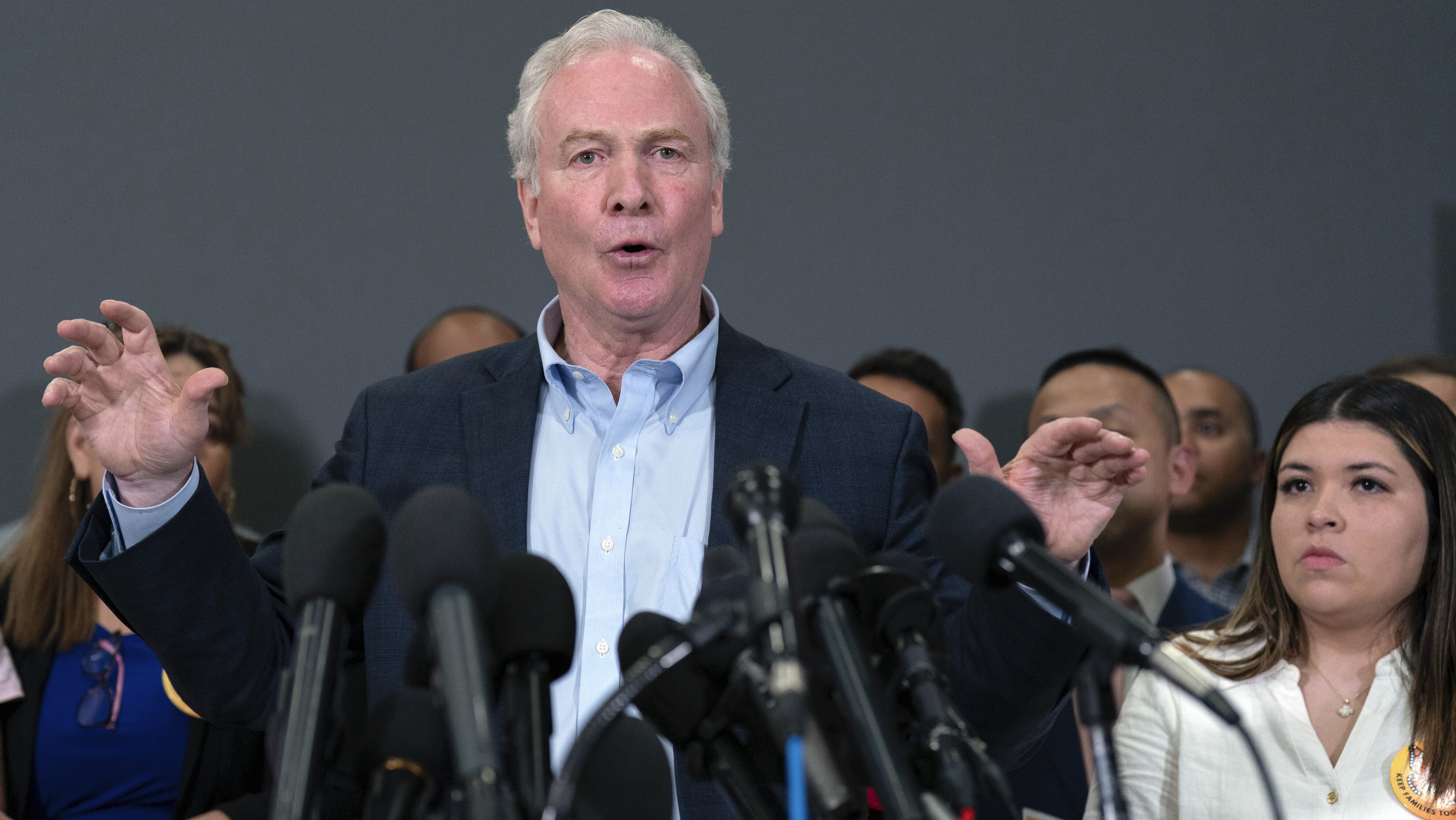Mistaken Deportation: Trauma & System Failures Exposed
Kilmar Abrego Garcia: Deportation Trauma Exposes System Failures
Introduction: A Nation's Apology, A Life Shattered
Imagine being ripped from your life, your home, everything you know, only to discover it was all a mistake. This isn't a plot from a dystopian novel; it's the reality faced by Kilmar Abrego Garcia. Senator Chris Van Hollen's recent meeting with Mr. Garcia sheds light on the profound trauma he experienced after being mistakenly deported to El Salvador. It begs the question: How could such a devastating error occur, and what measures are being taken to prevent future injustices?
The Senator's Account: A Glimpse into Kilmar Abrego Garcia's Trauma
Sen. Van Hollen, a Democrat from Maryland, painted a stark picture of Mr. Garcia's condition after their meeting. "The mistakenly deported man had been traumatized by his imprisonment in El Salvador," he stated. These words carry weight, suggesting a level of psychological damage that extends far beyond mere inconvenience. What does "traumatized" truly mean in this context?
Understanding the Depth of Trauma
Trauma isn't simply sadness or disappointment. It's a deep-seated emotional wound that can manifest in various ways, from anxiety and depression to post-traumatic stress disorder (PTSD). It can impact a person's ability to trust, form relationships, and even function in everyday life. We can only imagine the fear and uncertainty Mr. Garcia faced during his wrongful deportation and subsequent imprisonment.
The Deportation Process: Where Did Things Go Wrong?
The question looms large: How can someone be deported by mistake? The process is supposed to have checks and balances, multiple layers of verification. The fact that this happened suggests systemic failures that need immediate attention. Was it a case of mistaken identity? A clerical error? A lapse in communication?
Investigating the Root Causes
To prevent future tragedies, a thorough investigation is crucial. We need to understand exactly where the system broke down. Was it a failure in the initial identification process? Were there communication breakdowns between different agencies? Or was it a combination of factors that led to this catastrophic error?
El Salvador: Imprisonment and the Unknown
Being deported to a foreign country is daunting enough, but Mr. Garcia's experience was compounded by imprisonment. Imagine the fear and isolation of being held in a foreign prison, not knowing why or when you might be released. The uncertainty alone would be enough to cause significant psychological distress.
The Psychological Impact of Incarceration
Imprisonment can be a deeply traumatic experience, even under the best of circumstances. The loss of freedom, the potential for violence, and the isolation from loved ones can all take a toll on a person's mental health. For Mr. Garcia, this was compounded by the fact that he shouldn't have been there in the first place.
The Road to Recovery: Healing from Trauma
What does the future hold for Kilmar Abrego Garcia? Healing from trauma is a long and challenging process. It requires access to mental health services, a strong support system, and a sense of justice. Can the government provide the resources he needs to rebuild his life?
The Importance of Mental Health Support
Mental health professionals can play a crucial role in helping Mr. Garcia process his trauma and develop coping mechanisms. Therapy, medication, and other interventions can help him manage his symptoms and regain a sense of control over his life. It's essential that he has access to these services and that they are culturally sensitive and tailored to his specific needs.
The Government's Responsibility: Making Amends
The government has a moral and legal obligation to make amends for the harm it caused Mr. Garcia. This includes providing financial compensation, ensuring access to mental health services, and taking steps to prevent similar errors in the future. But can any amount of money truly compensate for the trauma he endured?
Beyond Financial Compensation: A Genuine Apology
While financial compensation is important, it's not enough. Mr. Garcia deserves a sincere apology from the government, acknowledging the profound harm it caused and committing to systemic reforms. This apology should be more than just words; it should be backed up by concrete actions.
Trump's Comments on Ukraine-Russia Negotiations: A Distraction?
Interestingly, the provided context also includes President Trump's comments on negotiations between Ukraine and Russia. While seemingly unrelated, this highlights the complexities of the political landscape and the potential for important issues to be overshadowed by larger geopolitical events. Is the focus on Ukraine-Russia negotiations distracting from domestic issues like Mr. Garcia's case?
The Urgency of Domestic Justice
While international affairs are undoubtedly important, it's crucial not to lose sight of the injustices that occur within our own borders. Mr. Garcia's case is a stark reminder that our immigration system is far from perfect and that mistakes can have devastating consequences. We must prioritize domestic justice alongside our foreign policy goals.
Rubio's Comments: U.S. to Drop Ukraine-Russia Peace Efforts?
Secretary of State Marco Rubio's suggestion that the U.S. might drop Ukraine-Russia peace efforts adds another layer of complexity. This raises questions about the long-term commitment to resolving the conflict and the potential impact on global stability. How will this shift in strategy affect the ongoing crisis?
The Ripple Effect of Policy Decisions
Policy decisions, whether related to immigration or foreign affairs, have far-reaching consequences. They can impact individuals, communities, and even entire nations. It's crucial that policymakers carefully consider the potential ramifications of their actions and strive to create policies that are both just and effective.
Acting IRS Commissioner Replacement: A Sign of Internal Turmoil?
The replacement of Acting IRS Commissioner Gary Shapley also raises questions about internal dynamics within the government. The circumstances surrounding his departure, particularly the alleged involvement of Elon Musk, suggest potential conflicts of interest and a lack of transparency. What does this mean for the integrity of the IRS?
Transparency and Accountability in Government
Transparency and accountability are essential for maintaining public trust in government institutions. When there are allegations of impropriety or conflicts of interest, it's crucial to conduct thorough investigations and hold those responsible accountable for their actions. The public has a right to know that government officials are acting in their best interests.
Moving Forward: Preventing Future Deportation Errors
The Kilmar Abrego Garcia case serves as a wake-up call. We must learn from this mistake and implement safeguards to prevent similar tragedies from occurring in the future. What specific steps can be taken to improve the accuracy and fairness of the deportation process?
Implementing Systemic Reforms
Systemic reforms are needed at every stage of the deportation process, from initial identification to final deportation orders. This includes improving training for immigration officials, implementing more robust verification procedures, and ensuring that individuals have access to legal representation. It also requires fostering a culture of accountability and transparency within immigration agencies.
Conclusion: A Call for Justice and Reform
The case of Kilmar Abrego Garcia is a stark reminder of the human cost of systemic failures. His trauma underscores the urgent need for immigration reform and a commitment to justice for all. We must hold the government accountable for its mistakes and work to create a system that is both fair and humane. It's not just about correcting past wrongs; it's about preventing future tragedies.
Frequently Asked Questions
- What specific mental health services are being offered to Kilmar Abrego Garcia?
While the exact details of Mr. Garcia's mental health support are private, it's expected that he would be offered comprehensive services, including therapy, psychiatric evaluation, and potential medication management. The goal is to address the PTSD and other psychological effects of his wrongful deportation and imprisonment.
- What steps are being taken to ensure this type of deportation error doesn't happen again?
The government should be reviewing its internal processes, improving cross-agency communication, and implementing more rigorous identity verification procedures. This might also include additional training for immigration officials and the use of updated technology to minimize human error.
- Is Kilmar Abrego Garcia a U.S. citizen or a legal resident?
The details regarding Mr. Garcia's legal status prior to the mistaken deportation are not fully clear from the provided context. However, the fact that he was "mistakenly" deported implies that he had a legal right to be in the United States, whether as a citizen, legal resident, or someone with a pending immigration case.
- What legal recourse does Kilmar Abrego Garcia have?
Mr. Garcia likely has grounds to pursue legal action against the government for wrongful deportation, false imprisonment, and the resulting emotional distress. He could seek financial compensation for the damages he suffered, including lost wages, medical expenses, and pain and suffering.
- How can the public help prevent similar injustices in the future?
The public can advocate for immigration reform, support organizations that provide legal assistance to immigrants, and hold elected officials accountable for ensuring fair and humane immigration policies. Staying informed and actively participating in the political process are crucial steps in preventing future injustices.

